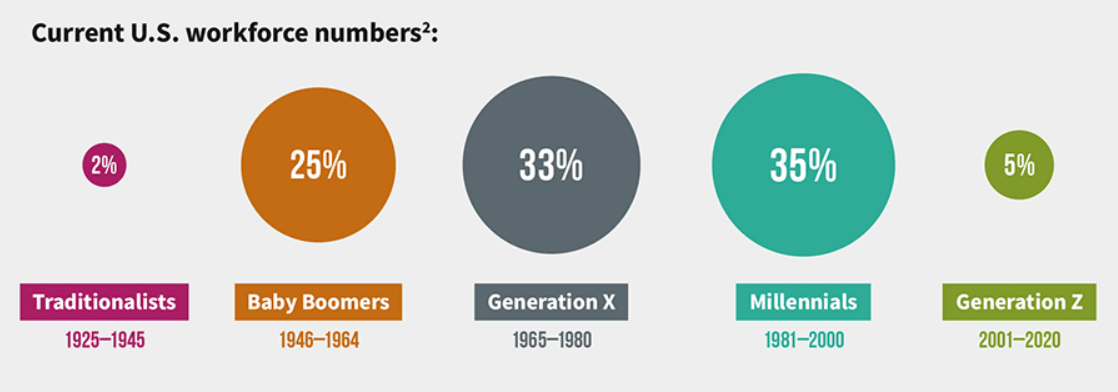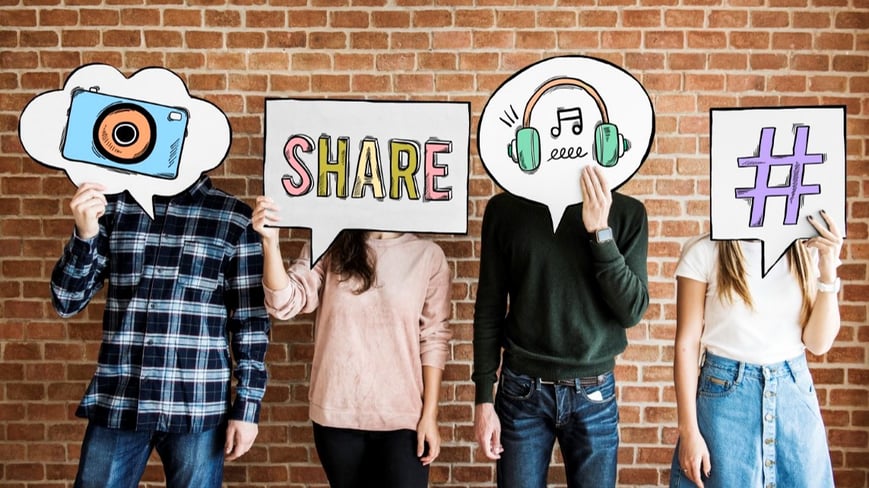Right now, we are living through a very special time. For the first time in history, there are five different generations in the workplace. As exciting as this is, it also presents organizations with new (and unexpected) challenges when it comes to everything from recruitment, onboarding, training, work style and talent retainment. Most managers today are from earlier generations and might be surprised - and even provoked - by the demands and expectations of the younger Generation Z. So how can managers better understand and effectively lead a multi-generational workforce?
If someone asked you what your ideal workplace would look like, do you know how you would respond? This question will get very different answers from members of different generations. Perhaps for some, the first thing that comes to mind is somewhere with great benefits and health coverage. For others, the feeling that your co-workers are like "family", or catered pizza lunch every Friday is more important. With times changing rapidly and the increasing need for people from various generations to co-exist in the same workplace (on-site or hybrid) - elements that used to support the “ideal workplace” have to change.
Let’s first define who the different generations in the workplace are:
- Generation Z — Born 1997 - 2020
- Millennials — Born 1981 - 1996
- Generation X — Born 1965 - 1980
- Baby Boomers — Born 1946 - 1964
- Traditionalists — Born 1925 - 1945

Source: Purdue Global
The mix of all these different generations offers great opportunities. Numerous studies have proven the strength in a diverse workforce. But it also presents a whole new set of challenges. It pretty much calls for five different strategies for recruiting, training, retaining, and succession planning. This is because the qualities, beliefs, cognitive development, and life experiences that define each of these generations vary greatly. In turn, this influences how workers carry out their job responsibilities, respond to change, communicate, handle conflict, etc. It’s important to identify and understand these generational differences and their response to organizational change.
What matters to Generation Z?
Generation Z is the latest generation entering the workplace, and perhaps this is also where the biggest change from earlier generations becomes most evident. Gen Z is the first generation where internet, e-mail and mobile phones were part of their every day lives. They are used to communicating, learning and entertaining themselves online, and they have access to a wealth of information. At Storyals, we know that learning and training on the job is very important for this generation. Dr. Bea Bourne, Professor at Purdue University Global and an expert on generational differences in the workplace, provides research that supports this claim. In her study “Generational Differences in the Workplace” she concluded that
84% of Generation Z expect their employer to provide them with proper training.
Another study from Handshake, an online recruiting platform for higher education students, surveyed students and recent graduates on different factors in the workplace that would motivate them to apply for and stay at a job. The conclusion showed that 1 out of 5 members of Gen Z would be more likely to stay at a job that provided them with various opportunities for upskilling and reskilling. The takeaway for managers here is that talent from Gen Z feels more invested in their job if they are provided with enough opportunities to learn and grow.
To get a better understanding, Storyals spoke to two women from Gen Z to get their view on things.
McCartney is a marketing manager at a satellite and radio broadcasting organization with over 2,000 employees. She describes her ideal workplace as one that allows her to work remotely. She values the flexibility of being able to travel back home to where she grew up in the Midwest, United States, to spend time with her family and dogs or visit her brother in California. She explained that this would be much more difficult if she had to go into the office five days a week. She also loves the fact that she can work from anywhere at any time.
Morgan, a social media manager for a small marketing agency in Florida let us in on her workplace priorities. She appreciates that her organization has a 4-day work week to prioritize employee mental health and emotional well-being. Having every Friday off allows her to feel refreshed and re-energized before she comes back to work on Monday. Her ideal workplace, however, is one that also provides sufficient training and learning opportunities. When speaking to Morgan, she explained how she wished there was more training available to her. This would have helped her better understand and feel more prepared in how to use the different tools and technologies available for her to do her job - especially when she first started at the company.
So, what about the other generations?
Millennials
Millennials (aka Gen Y), born 1981 to 1996, are characterized as being open-minded, achievement oriented, and competitive. These characteristics also support their worldview as they seek challenge, growth, and personal development. The preferred communication style for this generation is IMs (or instant messages accompanied by today’s many chat functions on social media apps) and emails. It’s important for managers to note that Millennials are motivated by responsibility, the quality of their manager, and unique work experiences.
Generation X
Generation X however, born 1965 to 1980, is known for being flexible, informal, skeptical, and independent. Members of this generation are motivated by diversity, a healthy work-life balance, and their personal-professional interests rather than the company’s interests. Like the Baby Boomers, their preferred communication style is whatever is the most efficient like face-to-face conversations or phone calls. Generation X is also known for favoring diversity and not hesitating to move on from a job if their employer fails to meet their needs.
Baby Boomers
Dr. Bourne’s study “Generational Differences in the Workplace” shows that Baby Boomers, born 1946 to 1964, are driven by company loyalty, projects or tasks that involve teamwork, and duty. They are known for being optimistic, competitive, and “workaholics”. Their communication style is shaped by whatever is the most efficient like face-to-face conversations or phone calls. Lastly, Baby Boomers maintain a worldview that achievement comes only after one has paid their dues and that one must make sacrifices to attain success.

Manage the differences to maximize outcomes!
For managers to lead their workforce effectively, to optimize communication and collaboration, having strategies that support generational differences is key. Utilize members of Gen Z to leverage new technology and to help others increase the use of digital tools available. Create a learning culture where generations benefit from each other's differences. The way to train and learn has changed drastically during the last few years.
Training on-demand and in the flow of work is already an expectation and will become even more so in the future - especially for members of Generation Z.
The experience and expertise of the Baby Boomers will be equally important to provide internal training and guide younger colleagues in their decision making. The combination of innovation, brought by younger generations, and years of experience and knowledge from more senior colleagues, offer great opportunity for increased productivity and different perspectives to enhance problem-solving.
Guidelines to collaborate effectively on Teams
If you're looking for more structure and more effective communication in your organization, check out Storyals Team House Rules. Clear defining rules like these in your organization can help your team, no matter what generation they are from, work more effectively together to streamline communication and optimize business processes and organizational goals.
FAQ
1. What are the specific challenges that managers face when creating training programs for a multi-generational workforce?
Challenges in Training Programs: Managers face several challenges when creating training programs for a multi-generational workforce. One of the main hurdles is designing content that is accessible and engaging for all age groups. Older generations might prefer more traditional, structured learning environments, while younger employees may seek interactive, technology-driven experiences. Balancing these needs requires a nuanced approach that often involves blending different teaching methods and tools. Additionally, addressing the varying levels of technological proficiency across generations can be difficult, as it’s important to ensure that no group feels alienated or overwhelmed by the training methods used.
2. How can organizations measure the success of their strategies in managing a multi-generational workforce?
Measuring Success of Strategies: To measure the success of strategies in managing a multi-generational workforce, organizations can track a variety of metrics. Employee engagement surveys can reveal how satisfied different age groups are with their work environment and whether they feel their needs are being met. Retention rates can indicate if the strategies are effective in maintaining a diverse age range within the company. Productivity levels and the quality of collaborative efforts can also serve as indicators of how well the generations are working together. Ultimately, the goal is to create a workplace where all generations feel valued and are able to contribute to their fullest potential.
3. What role does technology play in bridging the gap between different generations in the workplace?
Role of Technology: Technology plays a pivotal role in bridging the generational gap in the workplace. It can serve as a common ground where different generations can collaborate and communicate more effectively. For instance, using project management tools can help streamline workflows and keep everyone on the same page, regardless of their age. Social platforms can facilitate informal interactions and knowledge sharing, while training programs delivered through e-learning can cater to various learning preferences. By embracing technology, companies can create a more inclusive and dynamic work environment that leverages the strengths of each generation.
4. Can the generational differences be seen in remote or hybrid work environments, and how do they manifest?
Generational Differences in Remote or Hybrid Work: In remote or hybrid work environments, generational differences can become more pronounced. Older employees may prefer the structure and social aspects of an office setting, while younger workers often value the flexibility that remote work offers. These preferences can influence how each group perceives the necessity of physical office space and their approach to work-life balance. Companies need to consider these differences when implementing remote or hybrid policies to ensure that all employees, regardless of their generation, feel supported and engaged.
